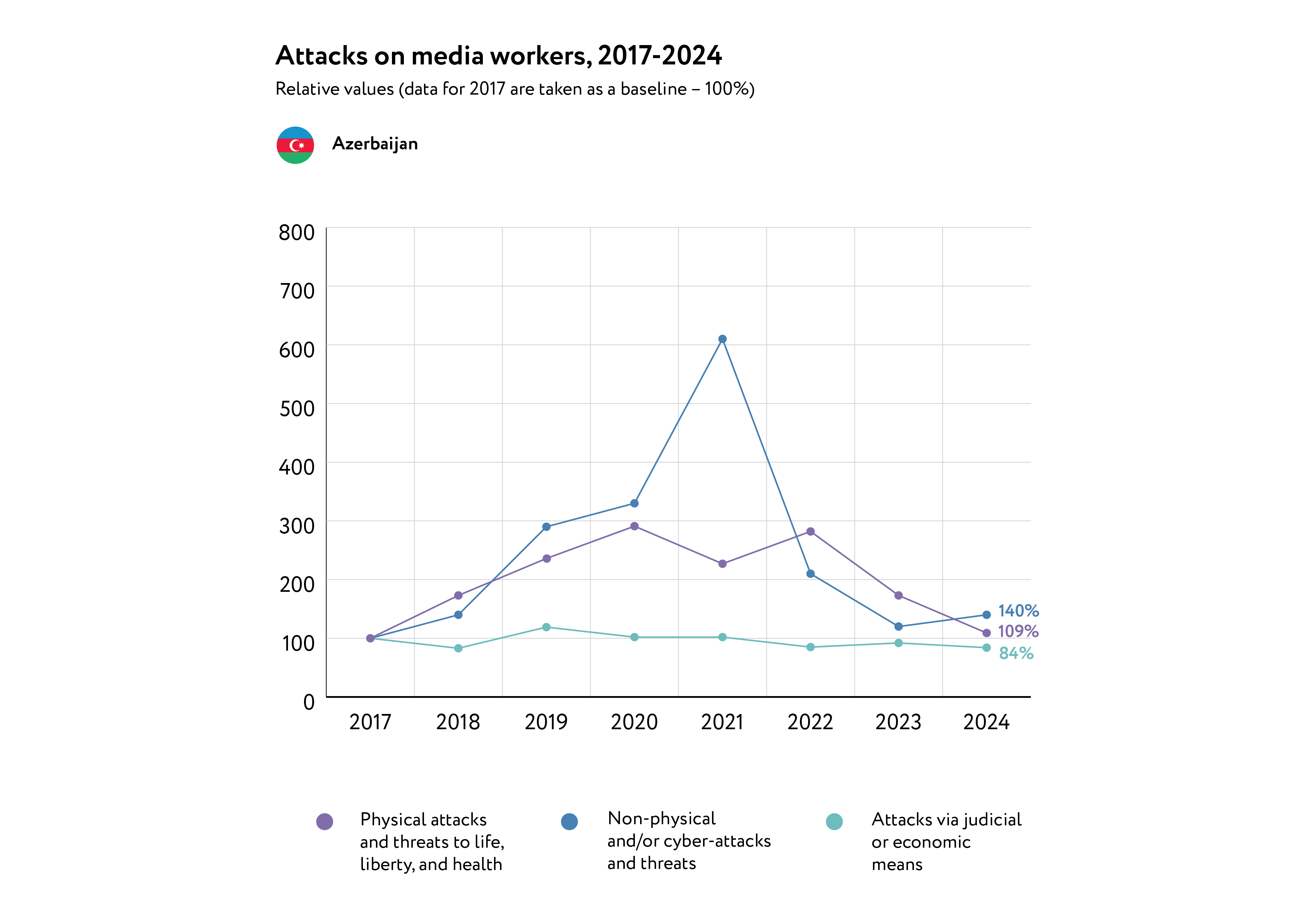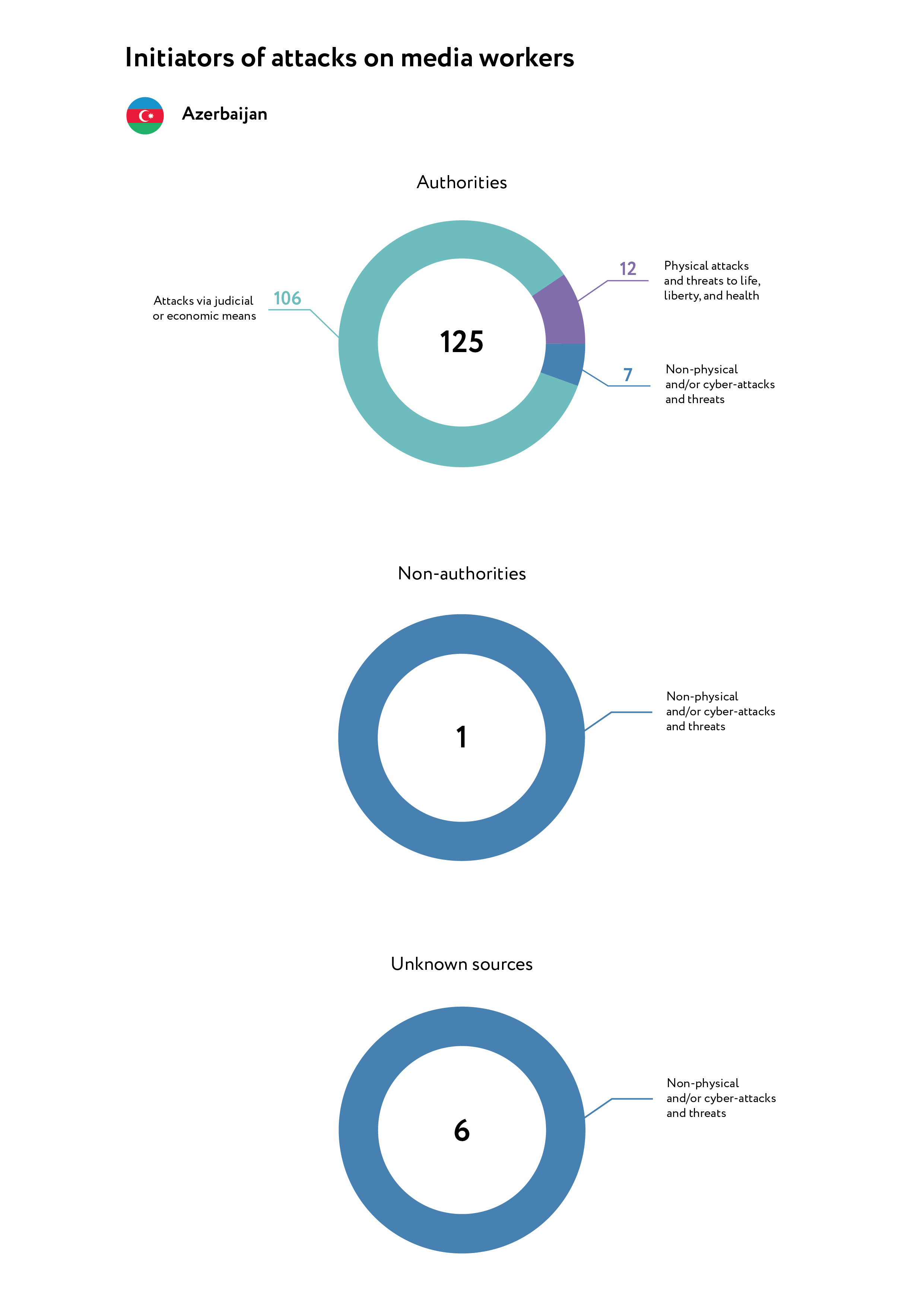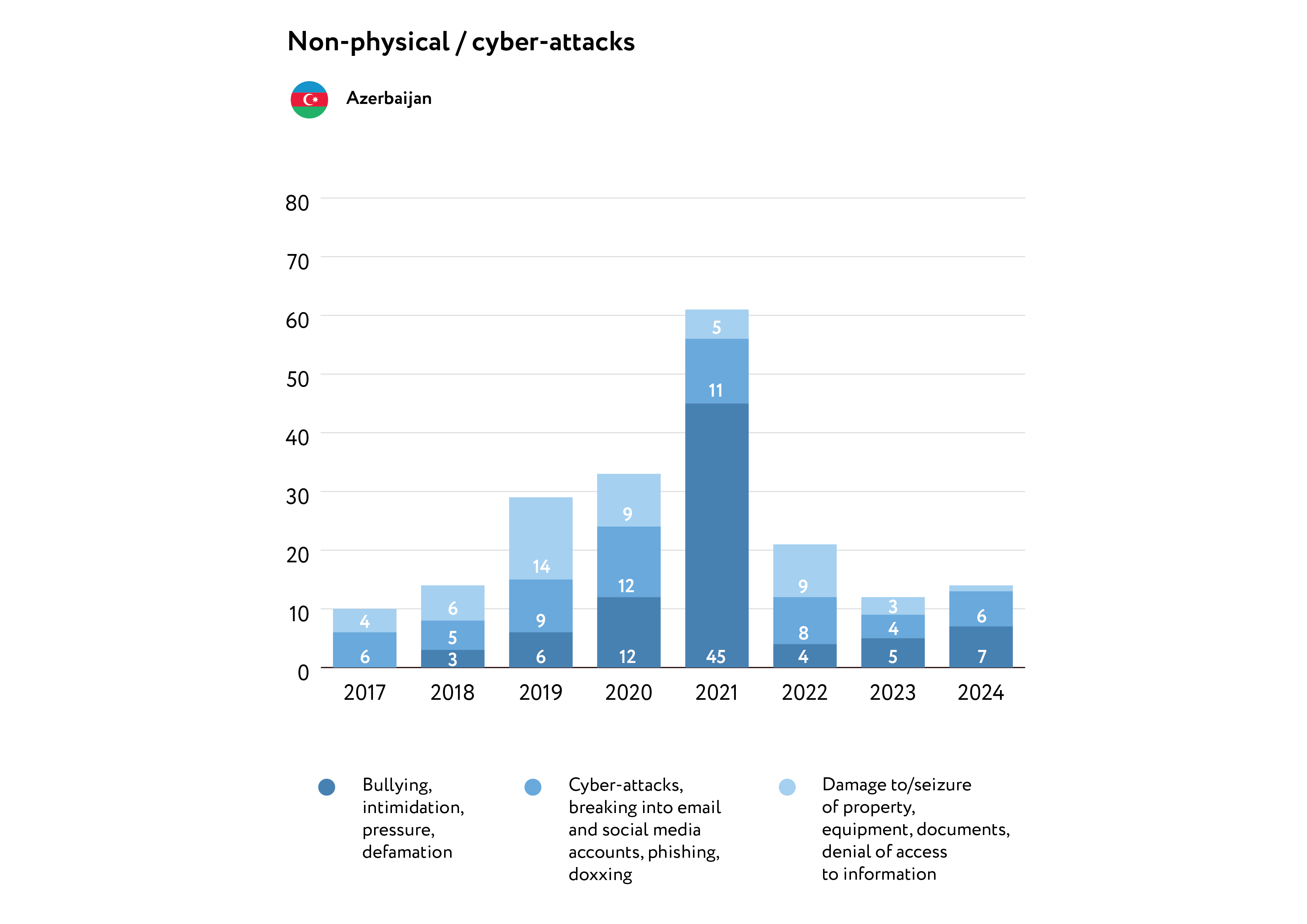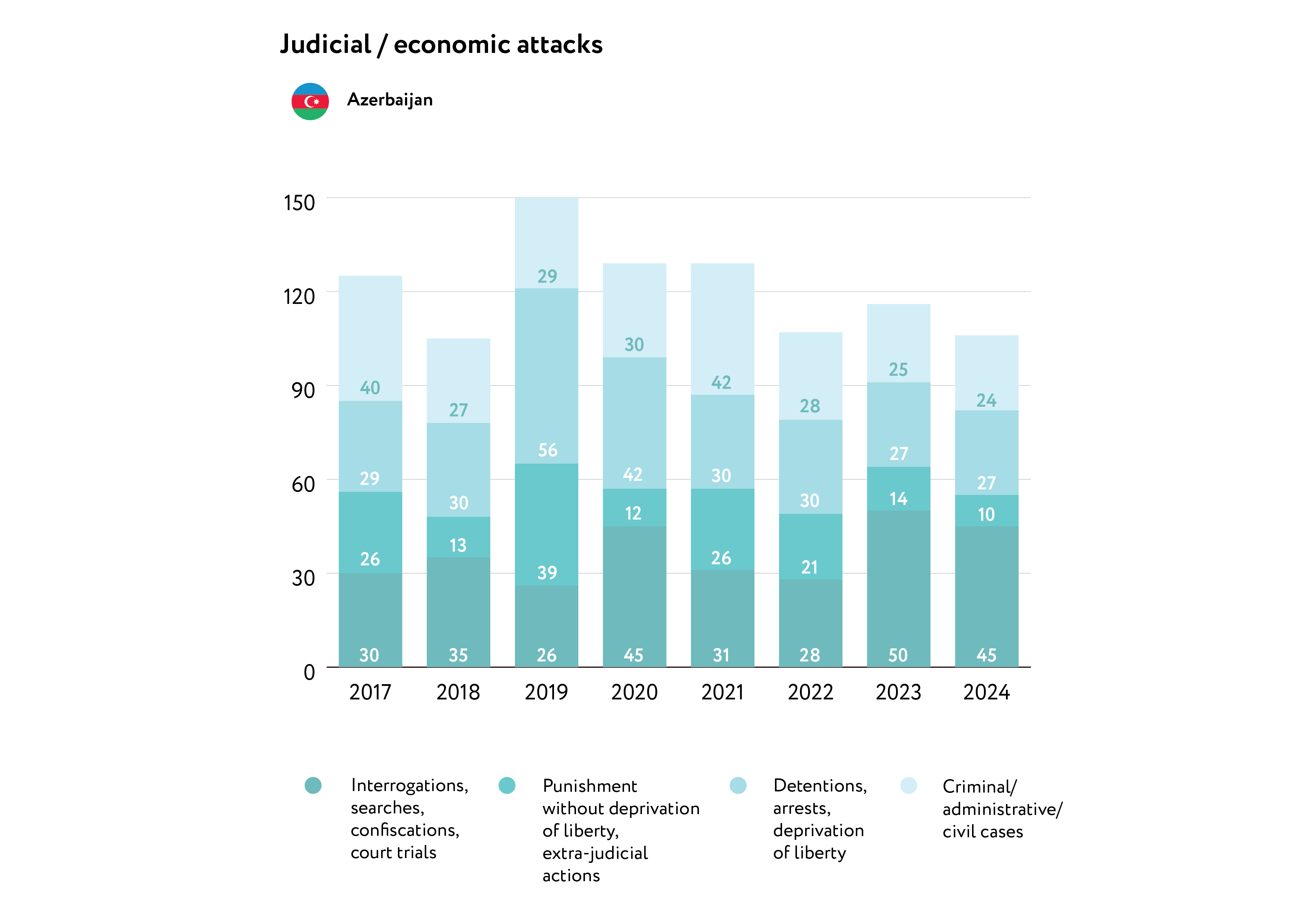PHOTO: Journalists arrested in Azerbaijan, Facebook page «Statuskar»
1/ KEY FINDINGS
In Azerbaijan, 132 incidents of attacks/threats against media professionals and citizen journalists, and editorial offices of traditional and online publications were identified and analysed in the course of the research for 2024. Data for the study was collected using open-source content analysis in Russian, Azerbaijani and English. In addition, information about these attacks was obtained from stories by journalists and bloggers, as well as statements from lawyers providing legal assistance to journalists. A list of the main sources is provided in Annex 1.
- In 2024, the targets of attacks were mainly against journalists who had already been imprisoned, or on those from independent media outlets which had been shut down.
- 2023 saw an unprecedented wave of persecution: more than 20 journalists and media workers are currently behind bars in Azerbaijan, most of the independent online media outlets have been shut down, and any form of pluralism is under threat.
- Rather than targeting individuals, the state now attacks journalists en masse: on 6 March 2024, police raided the office of the independent online television outlet, Toplum TV, and arrested dozens of employees from both the newsroom and the Institute for Democratic Initiatives, which shares the same office space. Technical equipment and personal phones of the staff were seized, and the office was sealed.
- In 2024, as in previous years, attacks via judicial and/or economic means remained the main method of putting pressure on media workers. The most serious incidents were linked to the strict enforcement of the new regressive Media Law.
2/ THE POLITICAL SITUATION AND THE MEDIA IN AZERBAIJAN
International organisations specialising in freedom of expression have concluded that there is a significant regression in the situation of media freedom and journalists’ rights in Azerbaijan.
In its Freedom in the World April 2024 report, Freedom House noted a regression in the field of media and freedom of expression in Azerbaijan as well as in all fundamental human rights and freedoms. The report states that Azerbaijan kept its position among “consolidated authoritarian regimes”, and ranks among the states where democracy has been declining over the last 20 years. Azerbaijan is only 1.07 points ahead of Tajikistan and Turkmenistan in democracy indicators. CPJ’s annual prison census puts Azerbaijan among the world’s top ten jailers of journalists in 2024.
In Freedom House’s Freedom on the Net report covering the period from June 2023 to May 2024, Azerbaijan scored 34 points (three points down from 2023) and remained categorized as “not free”. Azerbaijan has been sliding down this ranking for the last 15 years.
According to the global Press Freedom Index by Reporters Without Borders (RSF), Azerbaijan was ranked 164th out of 180 countries, down 13 places in a year. According to RSF, “the Azerbaijani Government has destroyed any semblance of pluralism, and since 2014, waged a merciless war against any remaining critics. Virtually the entire media sector is under official control, and state-owned television is the most popular information source. No independent television or radio is transmitted from within the country, and all print newspapers with a critical stance have been shut down. Most independent news sites, such as Azadliq and Meydan TV, targeted by state censorship, are based abroad”.
The 2024 Annual Report of the Council of Europe’s Platform for the Protection of Journalism and the Safety of Journalists, described the situation with Azerbaijani media as “dire”. The report highlighted the country’s practices of targeting journalists with surveillance spyware and sentencing journalists to short to long “administrative” detentions in retaliation for their work. There is a persistent environment of impunity for the murder of journalists.
Following the media legislation adopted in 2021, the Azerbaijani media landscape is now fully controlled by the authorities. Pursuant to the law, a media registry was established for the obligatory registration of all media outlets and journalists. Out of 6,000 operational media outlets only around 300 were included in the new registry, while the rest were denounced as illegal. In 2024, following lawsuits by the regulatory authority, the State Media Development Agency, the activities of about ten media outlets were banned by the courts’ rulings.
3/ GENERAL ANALYSIS OF ATTACKS
In 2024, at least 132 attacks against journalists, bloggers and other media workers were recorded in Azerbaijan. The number of recorded incidents has actually been decreasing annually since 2021, but this does not indicate a positive trend. The decrease is due to the intensified crackdown on the media in Azerbaijan, meaning there are fewer journalists to attack.

Attacks via judicial and/or economic means, as in previous years, remain the main method of exerting pressure on media workers in Azerbaijan. Compared to the previous year, the number of physical, non-physical and cyber-attacks has also decreased. In 90% of cases, government officials were responsible for attacks against the media.

4/ PHYSICAL ATTACKS AND THREATS TO LIFE, LIBERTY AND HEALTH
In 2024, at least 12 cases of physical assaults on media workers were reported in Azerbaijan, all carried out by representatives of the authorities. While in previous years journalists were primarily attacked while performing their professional duties— such as covering protests, public meetings, or during live broadcasts—this trend has shifted. Now, media workers are predominantly targeted while in prison or during detention.

The majority of recorded incidents involve mistreatment and abusive behaviour by law enforcement officers towards media workers who are currently in prison or detained awaiting sentencing.
- On 21 March, the journalists of Abzas Media, Sevinc Vagigqizi and Nargiz Absalamova, who were being kept in a pre-trial detention centre, reported they were being ill-treated: the heating in their cell was not working, the water was leaking, and no repairs ever took place. This led to a deterioration in the health of the imprisoned journalists.
- On 29 March, Shamo Eminov, a correspondent of Channel 13 Internet TV, who was being kept in solitary confinement, was subjected to insults and threats from senior staff of the detention centre. Protesting against his ill-treatment, he attempted suicide by cutting his hand with a piece of glass and consequently was hospitalized in the prison medical facility.
- On 30 May, Farid Mehralizada, a journalist for Radio Free Europe/Radio Liberty’s Azerbaijani Service (Azadliq Radiosu), was physically attacked by police officers while he was being detained. Mehralizada has been detained since then on charges of “conspiring to smuggle foreign currency” (Article 206.3.2 of the Azerbaijani Criminal Code). On that day, plainclothes law enforcement officers reportedly seized Mehralizada from the streets of Baku, placing a bag over his head and forcing him into a vehicle. Officers also raided his home and confiscated his computer, cell phones, and car. On 1 June, the Khatai District Court in Baku remanded Mehralizada into pre-trial detention as part of an investigation against the investigative outlet, Abzas Media. Both Abzas Media and Mehralizada denied that the journalist worked for that outlet. Mehralizada covered economic topics for Radio Azadliq, which is blocked in Azerbaijan and has operated from abroad since 2014.
- On 11 June, Ulvi Hasanli, the director of Abzas Media, was subjected to physical abuse while being transferred from court to the pre-trial detention centre. Handcuffed behind his back, the journalist was abused by forcing his head down. His protest against this ill-treatment led to intensified abuse against him.
- On 21 August, Ulvi Hasanli was attacked in the detention facility by a fellow cell inmate, wielding sharp objects and a razor blade, reportedly in retaliation after the journalist exposed to the media violations, abuses and tortures in the detention facility.
- In October, Ali Zeynal, a correspondent of Toplum TV was tortured inside the Baku Court of Appeal, where he was deliberately kept handcuffed and standing for nearly two hours.
- At the beginning of November, Polad Aslanov, head of the website Xeberman.com, was put in solitary confinement under the pretext of a lack of space in the ordinary cells. In protest, the journalist went on a lengthy hunger strike.
- In November, Abzas Media’s Nargiz Absalamova was repeatedly harassed by prison guards and her arm was injured. Following her speech at the court hearing, hitting out at the government and exposing the fabricated arrests and shaming of journalists, a group of inmates exerted more pressure on her.
- Her other arrested colleagues, Sevinj Vagifgizi and Elnara Gasimova also faced physical and psychological pressure after raising concerns about the provocation against Nargiz.
- In December, Ramin Jabrailzadeh (Deko), a journalist of Meydan TV, was brutally abused while being taken to a court hearing. His head was forcedly pushed down whilst he was handcuffed behind his back.
5/ NON-PHYSICAL AND/OR CYBER-ATTACKS AND THREATS
In 2024 at least 14 incidents of non-physical and cyber-attacks were recorded. The targets were mainly independent media outlets and journalists who were already in prison. The most widespread methods of attacks were cyber-attacks and threats of violence and death.

At least three incidents involving threats, including death threats, were recorded:
- On 21 August, Ulvi Hasanli, director of the independent news platform Abzas Media (see above), faced death threats while in Baku Pre-Trial Detention Centre No. 1. His wife, Rubaba Quliyeva, raised concerns about Hasanli’s safety in the facility after a telephone conversation with him. He described a pattern of harassment that intensified after he reported incidents of torture within the detention centre. One detainee had become increasingly aggressive towards him and repeatedly sought to provoke violent confrontations, brandishing a sharp object and issuing explicit death threats.
- In September, Vugar Mammadov, the senior chief editor of Hurriyyet newspaper and its internet television Hurriyyet TV, was contacted by unidentified people who threatened to cut off his ears if he continued his work.
- In November, Ganira Atash, the journalist known for her articles about medical problems, received a death threat against herself and her family via social media platforms.
At least six incidents of hacking and cyber-attacks were recorded:
- In March, after the police raided the office of Toplum TV, the toplumtv.info website was blocked and its YouTube channel and Instagram accounts were hacked. The title of the YouTube channel was changed and all 3000 videos were deleted. Prior to this, the Facebook Page of Toplum TV was hacked.
- In May, the pro-government internet television channels LAF, Müsavat TV and Ses TV were cyber-attacked, mainly during live broadcasts.
- In June, the YouTube channel of the Turan Information Agency was cyber-attacked. As a result, access to dozens of video interviews, reports and two documentaries was blocked.
- In December, all data from the communication programme of Aynur Ganbarova (Elgunesh), the chief of Meydan TV, including her voice recordings and texts exchanged with her colleagues, were illegally exposed to the public by government-controlled media which then published them.
Among other recorded incidents:
- In March, Zahid Oru, MP and Chair of the Parliamentarian Human Rights Committee, publicly threatened Azerbaijani journalists and bloggers residing in Europe and in the USA, in particular Sevinj Osmangizi, Tural Sadigli and Ganimat Zahid, well-known journalists and bloggers. The MP accused them of committing “information terror” and slander against the president of the country. The MP emphasized that any legal prosecution measures would be pointless and ineffective, and therefore declared journalists and bloggers in exile who focus on political issues to be “legitimate targets”.
- On 9 September the operating company Baku City Circuit refused to accredit Aziz Kerimov, a photojournalist of Turan Information Agency, to the Formula 1 race held on 13-15 September without giving any official reason.
- On the evening of 6 December, journalists of Meydan TV were detained in Baku. Journalist Khayala Agayeva was subjected to psychological pressure. In particular, she was forced to testify before her lawyer arrived. After the lawyer entered the defence she exercised the right to retract the initial testimony given in the absence of a lawyer.
6/ ATTACKS VIA JUDICIAL AND/OR ECONOMIC MEANS
In 2024, attacks via judicial and/or economic means remained the main method of pressure on media workers, with officials responsible for the vast majority of these incidents. The most severe incidents were linked to the strict enforcement of the new regressive Media Law. Following the court decision, dozens of media outlets had to suspend their activities. The arrest of over ten journalists throughout 2024 was also indirectly tied to the new law. Notable cases included interrogations, prosecutions for insults and slander, and administrative arrests—often occurring while journalists were performing their professional duties.

Closing down media outlets
In 2024, at least ten media outlets were suspended under the Media Law.
- In June, the Media Development Agency (MIA) applied to the court to terminate the activities of five media organisations — xeberal.az, azerbaycanrealligi.com, millitv.az, amia.az and siam.az – due to their failure to apply for registration in the media register. The Sumgayit Appellate Court had already decided to terminate the activities of kheral.az. According to articles 78, 65, and 62 of the law “On Media,” which stipulates that any media must apply to the Media Agency for registration in the Media Registry, if a media organisation fails to do so, the Agency can seek a court order to terminate its activities.
- At the end of 2024, Gundem xeber and Yeni Azerbayjan namine newspapers and their online resources, respectively gundemxeber.az and YeniAN.az, applied to be added to the register; but they were refused and shut down following the court order.
Searches and subsequent arrests
Throughout 2024, 18 journalists from media outlets known for their strong criticism of the government, including Toplum TV, Meydan TV, Abzas Media, Kanal 13, and meclis.info, have either been imprisoned or put under investigation. They were charged with receipt of financial means from foreign donors to finance their journalistic activities and smuggling those funds in Azerbaijan. The new law prohibits the receipt of foreign funds.
On 13 January, journalist Elnara Gasimova from Abzas Media was detained as a suspect after being interrogated on charges of smuggling committed by a group of persons in accordance with a previously arranged conspiracy. She denies the charge and links the arrest to her professional activities. Gasimova faces a sentence of five to eight years. On 6 March, police raided Toplum TV’s editorial office, confiscated its equipment and the phones of all journalists who were present, and took at least ten of them to the Baku City Police Department for questioning. Video editor Mushfig Jabbar, journalist Farid Ismayilov, and social media manager Elmir Abbasov were arrested. Several journalists who freelanced for the TV station were detained for several hours – Parvana Qurbanli, Alya Yaqublu, Shahnaz Beylerqizi, Cavid Ramazanov, Jamila Azimova, Gulyeter Mahmudova, Fidan Əlijanova and Moushviq Cabbarov. In the evening on the same day, Ismayilov’s house was searched. On 8 March, the Khatai District Court in Baku ordered Mushfig Jabbar’s detention for four months on charges of currency smuggling, while Ismayilov and Abbasov were granted bail.
- On 8 March, the founder of Toplum TV, Alesker Mammadli, was detained by plain-clothed men when entering the Istanbul clinic where he had been examined. As Mammadli approached his car, he was grabbed by plain-clothed men, put in another car and taken to an unknown destination. “He is accused of smuggling. He has serious health problems — his throat, rectum, and prostate have tumours that require surgery. He was detained today when he was on his way for a biopsy”, — the lawyer said. Mammadli denies the accusation. Mammadli’s flat was searched and EUR 60,000 were “found” as a result. His relatives said that the money did not belong to him, but was planted by police officers.
- Starting in March and continuing in the months that followed, Khadija Ismayil, the chief editor of Toplum TV, along with more than ten journalists who previously worked with the outlet, have been summoned for interrogations.
- On 10 July, independent journalist Samira Aliyeva was called to the Baku City Police Headquarters, where she was interrogated for four hours as a witness in the Toplum TV case. Aliyeva shared that, due to legal confidentiality requirements, she could not reveal the specifics of the interrogation.
- On 5 July 2024, Shamshad Agha, editor of Arqument.az, was questioned as a witness at the Baku City Chief Police Department in relation to the Toplum TV case. Authorities verbally informed him of a travel ban, barring him from leaving the country. On 5 February 2025, Shamshad Agha was found guilty in the Meydan TV case and sentenced to two months and one day in prison.
- On 18 April, Imran Aliyev, the founder of the Meclis.info website, was detained at Baku Airport and charged. Aliyev pleads not guilty. Local and international human rights organisations condemned the persecution of Aliyev and linked the criminal case against him to the activities of his website, which monitors the work of the Azerbaijani Parliament and its deputies.
- On 30 May, Farid Mehralizada, an economist and journalist with Radio Free Europe/Radio Liberty’s Azerbaijani service (Azadliq Radiosu), was detained on charges of “conspiring to smuggle foreign currency” (Article 206.3.2 of the Azerbaijani Criminal Code). On 1 June, the Khatai District Court in Baku remanded Mehralizada into pre-trial detention as part of an investigation against the investigative outlet Abzas Media.
In December, all Azerbaijan-based correspondents of Meydan TV, an internet television stationed with a central office in Germany and known for its highly critical content in Azerbaijan, including journalists Aynur Elgunash, Aytaj Ahmadova, Aysel Umudova, Khayala Aghayeva, Natiq Javadli, and Ramin Jabrayilzadeh were arrested. They were accused of “smuggling” and sent to the pre-trial detention centre.
Lengthy court sentences
- On 25 January, the Ganja Serious Crimes Court sentenced the editor of the website Demokratik.az, Osman Narimanoglu (Rzayev), to six and half years in prison. Narimanoglu was arrested on 5 July 2022 on charges of extortion.
- On 28 January, social activist and blogger Arzu Sayadoglu was arrested by the Sabail District Court. The accusations against Sayadoglu and the length of his arrest were not disclosed.
- On 5 February, the court found previously detained blogger Rashad Ramazanov guilty of “illegal drug trafficking” and sentenced him to five years and four months’ deprivation of liberty.
- In February, the trials of two journalists arrested two years earlier, Avaz Zeynalli, the chief of internet resource Xural TV and Elnur Shukurov, the chief of the Sada TV YouTube Channel, were concluded. The Baku Court for Grave Crimes found the journalists criminally guilty of “bribery” and “illegally influencing the decision of an official”. Zeynalli was sentenced to nine years, Shukyurov to four.
- On 17 April, the Sumgayit Serious Crimes Court found the blogger Jamil Mammadli guilty of “fraud” and “hooliganism” and sentenced him to six years and 12 days in prison.
- On 13 August, Vugar Gurdganli (Alekberov), founder of the news portal 24saat.org, was charged with “fraud” and arrested by decision of the court. Gurdganli faces up to five years in prison under these articles.
- On 28 December, the Baku Court for Serious Crimes sentenced Teymur Kerimov, founder of the Internet TV Kanal 11, to eight years of in prison. Kerimov said that the charge was false and he was not guilty. In December 2023, the Narimanov district court had arrested Kerimov, charging him under Articles 182.2.1 of the Criminal Code (extortion by threats committed by a group of persons), 182.2.2 and 182.2.4.
- Former journalist of the TV channel Istek Totiyeva, who was prosecuted together with Kerimov in the same case, was sentenced to a suspended sentence with a two-year probation period.
In addition to the above-mentioned incidents, other attacks were recorded in 2024. Some of the examples are presented below:
- On 15 January, journalist Shahin Rzayev was detained in the Surakhany village. By the decision of the Surakhany District Court, Rzayev was arrested for 15 days for crimes under Articles 510 (causing minor harm) and 535.1 (failure to comply with a lawful request of the police) of the Code of Administrative Offences of the Republic of Azerbaijan.
- On 8 June, Sevinj Sadigova, a journalist for the Azel TV YouTube channel, was briefly detained by police, taken to the 35th police station of the Khatai district, harassed and threatened. “There they began to insult me and mock me. They threatened me with administrative arrest. They said that they would take me to a mental hospital. Then they brought in an elderly man. He began to insult me because I was filming him in the passage without his permission”, Sadigova said.
- On 6 September, freelance journalist Shahla Karim was detained by law enforcement bodies in Neftchala District whilst she was performing her professional duty. The journalist was driven to Baku, around 180 kilometres away, where she was released. The journalist said on her Facebook page that her microphone was confiscated.
- On 11 September, the Musavat Party filed a lawsuit against the Qafqazinfo.az news portal for distributing false information. The Party demanded a refutation from Qafqazinfo.az, but the website refused.
- On 28 November, Seymur Mammadov, chief director of Aztvnews.az website, Zaur Ahmadov, chief director of Qaynar-xett.az website, Eldaniz Mejdunov, chief director of Postbaku.net news website, and Elvin Qurbanov, the chief director of Aja.az website was arrested on charges of “violent extortion”.
- On 8 December, the photojournalist Ahmad Mukhtar was charged with minor hooliganism and disobedience to the police and was sentenced to 29 days of administrative arrest.
- In December, journalists who were covering the arrests of their Meydan TV colleagues – Ahmad Mukhtar, Kamran Mammadli, Rashad Ergun and Elnur Jabrayilzadeh – were also detained and taken to the police station.
ANNEX 1: OPEN SOURCES USED FOR GATHERING DATA (AZERBAIJAN)
- Azadlıq Radiosu – the Azerbaijani service of Radio Free Europe/Radio Liberty;
- Arqument.az – an Azerbaijani news site;
- Committee to Protect Journalists – an American independent, nonprofit, non-governmental organisation based in New York City, with correspondents around the world. CPJ promotes press freedom and defends the rights of journalists;
- Election Monitoring and Democracy Studies Center (EMDS) – a non-governmental organisation. Main goals — elections monitoring and the formation of democratic institutions in Azerbaijan;
- Freedom House – a non-profit organization based in Washington, D.C. It is best known for political advocacy surrounding issues of democracy, political freedom, and human rights;
- Gözətçi – a news site of Azerbaijan. The website aims to collate information on human rights violations;
- Meydan.TV – a weekly online television channel. Its mission — is to inform active members of society about the state of affairs in politics, the economy, and social life; to offer a platform for open and diverse discussions on all topical questions concerning Azerbaijani society;
- Platform to promote the protection of journalism and safety of journalists – a collaborative effort between the Council of Europe and a network of prominent press freedom organisations. Its primary objective is to be a real-time mechanism for monitoring and addressing threats against journalists and media professionals, ranging from harassment and physical attacks to legal and political pressures;
- Reporters Without Borders – an international non-profit and non-governmental organization that safeguards the right to freedom of information;
- Turan – an independent news agency. The agency distributes news, analytical articles, and overviews from Azerbaijan;
- Toplum.TV – an Azerbaijani news site;
- Voice of America – a multimedia news organisation in the USA that produces content in over 45 of the world’s languages for audiences with limited access to a free press.
